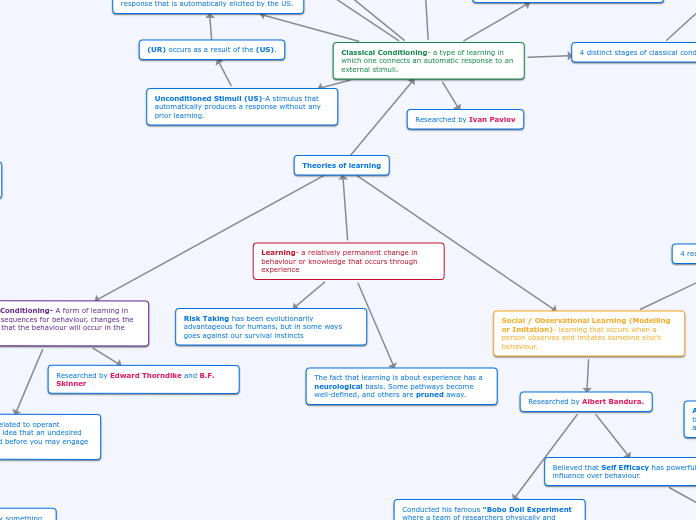Learning- a relatively permanent change in behaviour or knowledge that occurs through experience
Theories of learning
Risk Taking has been evolutionarily advantageous for humans, but in some ways goes against our survival instincts
The fact that learning is about experience has a neurological basis. Some pathways become well-defined, and others are pruned away.
Operant Conditioning- A form of learning in which consequences for behaviour, changes the likelihood that the behaviour will occur in the future.
Reinforcement- Anything that has the effect of strengthening a particular behaviour and makes it likely that the behaviour will happen again.
Positive Reinforcement- adding something positive after a behaviour is observed.
Negative Reinforcement- taking away something negative after a behaviour is observed.
Reinforcement is generally more effective than punishment in the long-term.
Schedules of Reinforcement.
Fixed-Ratio Schedule- A behaviour is reinforced after a set number of responses.
One knows when reinforcement will occur.
Variable-Ratio Schedule- A behaviour is reinforced after an average number of times, but on an unpredictable basis.
One doesn't know when reinforcement will occur.
Reinforcement occurs after a response.
Fixed-Interval Schedule- The first appropriate response after a fixed amount of time is reinforced.
Reinforcement occurs after a period of time
Variable-Interval Schedule- A response is reinforced after a variable amount of time has elapsed.
Punishment –A consequence that decreases the probability of a behaviour occurring.
Positive Punishment- adding an adverse stimuli in response to an observed behaviour.
NegativePunishment- taking away something desirable in response to an observed behaviour.
Researched by Edward Thorndike and B.F. Skinner
Premack Principal- Related to operant conditioning, this is the idea that an undesired task must be completed before you may engage in a reinforcing activity.
Social / Observational Learning (Modelling or Imitation)- learning that occurs when a person observes and imitates someone else’s behaviour.
4 requirements for Observational Learning.
Attention- the model must have the attention of the learner (ideally the model should be appealing to the learner).
Retention- the learner requires clarity and meaning from the model.
Motor Reproduction- must have the skill and practice to be able to replicate.
Reinforcement- if the model is reinforced than it enhances the effects of observational learning.
Researched by Albert Bandura.
Conducted his famous "Bobo Doll Experiment where a team of researchers physically and verbally abused an inflatable doll in front of preschool-age children, which led the children to later mimic the behaviour of the adults by attacking the doll in the same fashion.
Believed that Self Efficacy has powerful influence over behaviour.
Self Efficiency- the belief that one can master a situation and produce positive outcomes.
Classical Conditioning- a type of learning in which one connects an automatic response to an external stimuli.
Unconditioned Stimuli (US)-A stimulus that automatically produces a response without any prior learning.
(UR) occurs as a result of the (US).
Unconditioned Response (UR)- An unlearned response that is automatically elicited by the US.
Neutral Stimulus- a stimulus that does not bring about a desired response (before learning or conditioning).
Neutral Stimulus turns into the Conditioned Stimulus after association with US.
Conditioned Response (CR)- A learned response to the conditioned stimulus that occurs after US-CS pairing.
Conditioned Stimulus (CS)- a previously neutral stimulus that eventually elicits a conditioned response after being associated with the US.
(CR) occurs as a result of the (CS).
4 distinct stages of classical conditioning.
These stages are not in any particular order. One does not need to pass through one stage before going to the next, nor does a person/animal necessarily experience all the stages.
Acquisition- the initial phase of learning the conditioned response.
Extinction- the disappearance of the conditioned response brought about by repeatedly presenting the stimulus without the US.
Generalization- After a conditioned response to one stimulus has been learned, the subject may also respond to similar stimuli without further training.
Discrimination- occurs when an individual learns to produce a conditioned response to one stimulus, but not to another similar stimulus.
Essentially, opposites.
